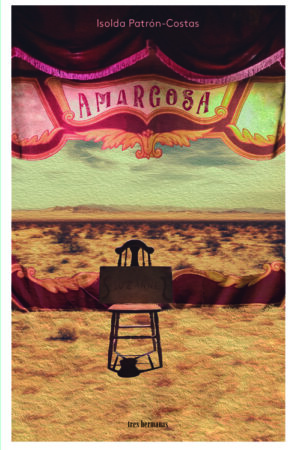Amargosa
Marta flees from her home in Los Angeles by car after catching her boyfriend, George, in bed with her neighbor and friend Jessica. After several hours of driving, her car, a '68 Ford Mustang, breaks down in the middle of the desert. Marta walks several kilometers under the sun in search of help. This is how she discovers Amargosa, a hotel-theater that shimmers like a mirage in the heat and dust. The place is run by a dancer named Suzanne who, despite her age, puts on a dance show every Saturday. Suzanne invites Marta to stay until Tom, her friend and collaborator, can fix the car.
Time stretches on as Marta remains in this limbo between the reality of her life in Los Angeles—from where thoughts of her boyfriend frequently arise—and Amargosa, a place so surreal it's hard to leave. Without a cell phone or any contact with her previous life, Marta spends her days surrounded by characters like Suzanne, who over the years has painted an audience above the theater seats; Mona/Roger, an eccentric and entertaining person who switches between being Mona one day and Roger the next; Tom, who arrived at Amargosa at just eighteen; and Nora, an enigmatic figure one never actually sees.
After some time, George arrives in Amargosa in a desperate attempt to win Marta back. She then falls into a sea of doubts where she feels torn between going back to her old life or getting carried away and follow her instincts and everything she has learned while in Amargosa. In the end, Marta overcomes her fears and discovers that she no longer wants to be with her boyfriend. She decides to leave anyway, with her Mustang fixed, but not before watching Suzanne dance one more time.
Written in first person and with a classic structure in three acts, Amargosa is dramatic literary fiction at its finest, with western genre overtones where space and atmosphere envelop the characters like a second skin.
Request more informationOriginal Language
SPANISH | Tres Hermanas
Prizes
Finalist for the 2021 Felipe Trigo Novel Prize
Finalist for the 2022 Premier Roman Award
Reviews
“Amargosa is a place turned into a character through the world of the senses. It exudes sensoriality; you do not only see it, you also smell it and feel it. It is a journey where two halves come together: ugly reality and paradise; a paradise built, curiously, from the ashes. It brings me to that desert of Dino Buzzati in his concept of escape and of those illusions that make the human being great as well as vulnerable. An original novel full of virtues. A very promising writer.” Elena Belmonte, author of La época del agua
“It is difficult not to link the fiction of Isolda Patrón-Costas with the stories of Sam Shepard.”
Rubén Abella, author of El libro del amor esquivo and Lo que dice la sangre
“Amargosa is an extraordinary story. We find in it the best impulses of the fictional narratives of the self through a powerful feminine voice that assumes its destiny and opens herself to the unexpected and unpredictable. Of remarkable expressive quality, this travel novel of love and heartbreak, based in California, progresses through the events, through discoveries, but —above all— through the dialogue and the capacity of the protagonist to flow in the relationship with others. Amargosa is a novel of the 21st century as hazardous time where everything can change in an instant, but where the characters can have the last word in their destiny. The reader will leave transformed and enriched from this adventure.”
Manuel Ángel Vázquel-Medel, writer and professor at the University of Seville
“A woman that drives a Ford Mustang through the desert, an Opera House lost in the middle of nowhere, a smartphone that goes out the window, the hangover of a betrayal and the need to die to be able to change plumage after an extraordinary experience… These are the elements with which Patrón-Costas weaves the exceptional novel of Amargosa, an initiation and mythical-poetic road movie in which the heritage narrative —myth, magical tale and dream— shows its purest profiles. A gallery of ambiguous characters, tricksters, mentors and assistants to the heroine parade through the novel. In the end, as any journey that is worthwhile, nothing will ever be the same… A new voice that knows how to magnificently braid betrayal and myth.”
David Hernández De la Fuente, La Razón
